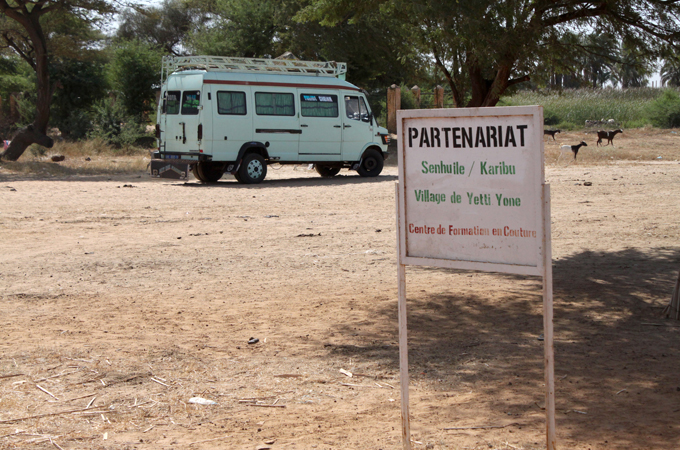NDIAEL, Senegal—A large-scale agriculture project run by an Italian company has sparked protests in northern Senegal with local livestock owners threatening to march their cattle to the capital to get the deal cancelled.
The company Senhuile, owned 51 percent by Italian Tampieri Financial Group and 49 percent by Senegalese Senethanol SA, has been granted 20,000 hectares of farmland to produce sunflower seeds for export to Italy. But the land in the area of Ndiael was formerly designated for nature preservation.
One day they turned up here and started logging, said Bayal Sow, chief of the rural community of Thiamene. They have taken over our grazing land. Now, we don`t know where to go with our animals.
The Senhuile project affects 37 villages in the area, mainly inhabited by Peul cattle farmers. In 2010, the agricultural export programme was established in the area of Fanaye, some 100 kilometers away, and triggered violent protests by local communities that left two people dead.
Former president Abdoulaye Wade decided to relocate the project to the Ndiael nature reserve, after re-classifying 20,000 hectares of forest land into agriculture land for use by the investors. President Macky Sall confirmed the deal.
We were shocked as we heard the news. In recent years, local farmers had tried many times to get some lots of land but failed because the area was protected. These foreigners got the land in one day thanks to their good connections with the government, Amadou Ka, a farmer from the Kaddu Ndef village, told Al Jazeera.
Government Silence
The Senegalese government is not keen to speak on the subject. The minister of agriculture didn`t answer requests for an interview from Al Jazeera.
At the Senegalese investment promotion agency (APIX) in Dakar, Baye Elimane Gueye, head monitor of the investments department, refused to disclose any information about the project.
The duration of the lease is not clear, nor is the rental price charged by the government. Attempts to see the lease failed. The Senhuile project is very controversial, said Gueye.
A report published in November by a coalition of international and Senegalese NGOs highlighted the issue and condemned the underlying land grab involved.
The project continues to be a lightning rod of tension and conflict,” it said. “Some [villagers] find themselves suddenly surrounded by the project and cut off from their grazing lands and water sources, feeling dispossessed by the state and at a loss for how to survive. Others complain of harassment, eviction and poor compensation.
The report focused on the structure of the companies involved, which it described as highly complex. Senethanol is owned at 25 percent by unnamed Senegalese investors and 75 percent by Agro Bioethanol Int LLC (ABE), a company registered in New York in 2009 under the direction of Harmodio Herrera, a Panamanian trustee who is also director of hundreds of shell companies in tax haven Panama.
The current CEO of Senhethanol, as well as general director of Senhuile, is Benjamin Dummai, an Israeli-born businessman convicted of fraud and tax evasion in Brazil, where he spent many years before moving to Italy and then to Senegal. Dummai rejected requests for comment.
The president of Senhuile is Gora Seck, a Senegalese businessman with interests in the mining sector and ties both with the government of former president Wade and his successor, Sall.
Grain, one of the groups that produced the report, is a small non-profit organisation that supports small farmers and social movements. It said professional investigators were hired to look into the operation in northern Senegal.
We began by trying to figure out the people behind the project. This was no easy task, the report said. The identity of some of the investors turned out to be hidden both legally [in the US and Senegal] and politically [in Senegal and Italy.]
After six months of research, we were able to uncover much of the complex web of questionable actors and shady legal structures that are connected to the project. Still, questions about the ultimate ownership of the project remain.
Growing What?
Not only is the structure of the company murky, it is also unclear what Senhuile is actually growing on the leased land. Created as an investment for agro-fuel production to be exported to Europe, the company has changed its plans many times.
Tampieri joined the project to get raw grains for its edible oil producing factory in Italy and plans to make an investment of 15 million euros (US$20m) over the next five years, sales manager Carlo Tampieri told Al Jazeera.
Yet at the moment, production has been discontinued. The Senegalese press announced a deal between the Institut Senegalais de Recherches Agricoles (ISRA) and Senhuile to produce seeds for research and local consumption. Tampieri confirmed to Al Jazeera that production had been discontinued, but added he was confident it would resume at any time.
The company doesn`t allow anyone to get close to the area, and local police are deployed to block access. This reporter was taken by police to their headquarters an hour`s drive away and urged not to return before being released.
The farmers from the Ndiale area, meanwhile, have vowed to never let foreigners occupy their land.
We will resist by any means necessary, said the community chief Sow. We are ready to march to Dakar with all our cows to make the government change its mind.
Photos: Stefano Liberti/Al Jazeera














